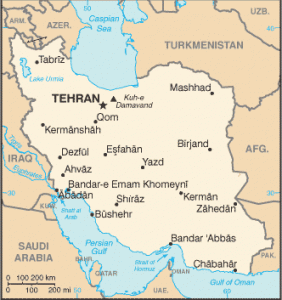Western officials are pointing to a supposed lack of success in Iran’s parallel talks with the UN nuclear watchdog as a further point of leverage ahead of a third round of negotiations between the Islamic Republic and world powers.
 “We’re disappointed,” said Robert Wood, acting U.S. envoy to the IAEA, in reference to the failure of Iran and the IAEA to come to a final agreement on Friday.
“We’re disappointed,” said Robert Wood, acting U.S. envoy to the IAEA, in reference to the failure of Iran and the IAEA to come to a final agreement on Friday.
“Yesterday’s outcome highlights Iran’s continued failure to abide by its commitment to the IAEA, and further underscores the need for it to work with the IAEA to address international community’s real concerns,” he said.
The IAEA had been pressing Tehran to give its inspectors immediate access to the Parchin military complex – not a declared nuclear facility – where it believes testing or research for weaponization might have recently taken place, although they’ve offered almost no evidence for the charge.
Western powers have little to criticize Iran for in this diplomatic process, given they’ve demanded Iran halt all or most of its uranium enrichment – thus denying the rights afforded them under international treaties – and refused to ease the harsh economic sanctions dragging down Iran’s economy.
All of this is being done in an environment of intimidation. As Reza Nasri over at PBS Frontline’s Tehran Bureau put it recently, “world powers are again poised to ‘solve’ an international crisis through an ‘agreement’ that is essentially predicated on intimidation, illegal threats of military action, unilateral ‘crippling’ sanctions, sabotage, and extrajudicial killings of Iran’s brightest minds.”
After the failed talks in 2009 and 2010, wherein Obama ended up mysteriously rejecting the very deal he demanded the Iranians accept, as Harvard Prof. of international affairs Stephen Walt wrote last week, the Iranian leadership “has good grounds for viewing Obama as inherently untrustworthy.”
The Iranians have offered a full stop to uranium enrichment at 20 percent – the supposed pretext for these talks – so long as the West agrees to ease the economic warfare crippling Iran’s energy and banking sector. But the West has not yet responded to such overtures, which could lead to a breakdown of talks altogether.





Israel wants war and unrest in ME. Full stop. US" Knesset "has last world…..
Speaking of 'Iran's failure to abide by its commitments to the IAEA' I am curious to know what are America's 'commitments' to the IAEA ? Surely Iran is not the only one to have such commitments ? When was the last time there was an inspection of US nuclear facilities ? I have never ever heard of one.
nder the NPT the US is committed to reduce its stockpile of nuclear weapons gradually to zero, but is actually buiding newer bombs.
“Iranian leadership has good grounds for viewing Obama as inherently untrustworthy.”
Paid actor Obama was hand-picked for the job by the corporate rich, as the job is to not let the world catch on that the rich call all the shots in Empire USA.
So, when Obama leaves office he will be hated by the American public just as much as was Bush, as their job was to take all the heat for the rich, so that laugh all the way to the bank can the rich.
There are 196 countries in the world of which 193 are UN members. Of all these countries only one has massacred people by nuclear weapons, and has caused birth deformities by using depleted uranium arsenal.
Now picture this: This country has allowed itself to become the self-appointed spokesperson for the world, deciding which country can or cannot use nuclear energy for peaceful purposes. Would someone please tell it to mind its own tricking business?
If you seek to be aware, and not be led around by the nose, you must discover the true agenda of the various parties and then look to see how their words and actions further their respective agendas. In the case of Iran it would appear that the West is concerned with their nuclear program. Not at all. The phony "concern" over the nuclear program is merely a pretext for inflating the Iran-is-evil narrative so that Iran can be fully exploited as the next boogieman (after the loss of the Soviet Union). Iran is today's excuse — One of them. The War on Terror is the other major, while China, Russia, are held in reserve — for the continuation of the capitalist profit centers of US militarism and imperialism.
The US Embassy hostage crisis in Iran made that country the perfect candidate for permanent enemy status. The weak minded and the empty-headed "patriots" can now and forever be persuaded to cheer for and vote for anyone who snarls at the Mad Mullahs. Thus evil Iran made itself into an irresistibly effective political tool. And thus, US "democracy" — quotes indicate a fraudulent and utterly defective reality — slides into a cartoonish contradiction, enabled by elite propaganda and an ignorant, or blindly, savagely emotion-driven populace.
This is an old old story, which knowing the truth won't change. So you're screwed. If you want to be happy, best just leave off trying to find the truth,…and believe. If you still want the truth, miserable though it will make you, then read between the lines.